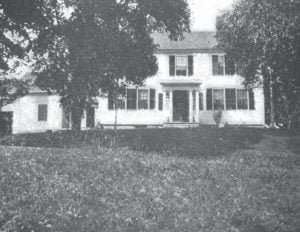One of the farms in Norwich still (1904) owned and occupied by descendants bearing the name of the original settlers, belongs in the Loveland family.
Joseph Loveland was born in 1747, in Connecticut; moving from that state to Dartmouth College, Hanover township, New Hampshire, where he enlisted to reinforce the Continental Army at Ticonderoga. In 1778 he settled on a now fertile farm, about a mile and a half from Norwich village, building a home a little off the river road. Ten of his thirteen children were born in town, and six of them made, during most of their lives, their native place their home; dying, with one exception, in the town, at an average age of seventy-two years.
Aaron, one of Joseph’s older sons, familiarly known as “The Judge” graduated at Dartmouth in the same class as Daniel Webster, with whom he roomed during part of his college course. Being the best Greek scholar of his class, he had an oration in that language at Commencement. Though a lawyer he lived the life of a recluse; he was ever a conservator of the peace rather than an instigator of litigation. He represented Norwich several times in the legislature, and was Chief Judge of Windsor County court in 1823. He died in 1870, at the advanced age of eighty-nine years.

David Loveland, the next younger brother of Aaron, made farming his chief business, at which he worked early and late, with good success. A few years before his death, in 1828, he built a new house on his river farm, about three miles from the village. As his fatherless sons grew up the land was divided, George (1816-1889) building another house, where his son Edward still lives. In that home five children were brought up to be useful members of society, and there he and his wife (Ruby Hatch) celebrated their golden wedding. Besides careful attention to farming, he found time to do work, both in and out of office, in the interests of the community.
John Wheatley Loveland, David’s youngest son, for nearly seventy-seven years lived in the house where he was born, and there he died in 1901. He began to farm for himself at the age of seventeen, supplementing a limited education by study and reading at home. He did much business for others and was regarded a safe counselor. For forty years or more he served the town in some capacity as an officer, being twice elected to the legislature, and was of especial service as selectman and recruiting officer during the Civil War.
William Loveland, the fifth son of Joseph, succeeded his father on the original homestead, and was called “the model farmer.” He was interested in natural history and was considered an authority on animals, birds and flowers. He, too, labored in behalf of the town both at home and in the legislature. His oldest son, Joseph Talcott, kept up the old home until his death in 1889, at the age of seventy-one. Someone said of him: “He exemplified in his career and life the best type of that class of American citizens following agricultural pursuits.” Of strict integrity, he was honored with trusts, both public and private, including four elections to the legislature. His brother Aaron had been, for some years before Joseph’s death, associated with him on the home farm, and he now lives in the big, old house, while his son, Joseph H., occupies another house on half the original farm.
David A. Loveland (1839-1898), eldest son of George, though having for some years business elsewhere, always made Norwich his home and was elected to various town offices. He represented the town in the legislature and was later a senator from Windsor County.
The Lovelands were by inheritance Federalists, then Whigs, then Republicans. They have been attendants and supporters of the Congregational churches, and more than twenty bearing the name have been at some time members of the village church. While being in this region, in the main, true to their name, and lovers of country life and its labors, there have not been wanting members of the learned professions in the family, particularly among those who have gone away to seek their fortunes elsewhere. Four lawyers of the name were born here, and several have been teachers for a longer or shorter time.
Some of Joseph the First’s descendants may be found in many states, and following various lines of business, and different professions.
At this writing, there are only eight who bear the name of Loveland, in town, though five homes are kept up by members of the family, and a considerable number reside here, who from their ancestry are entitled to a place in the genealogy.
